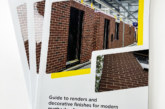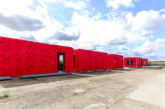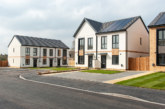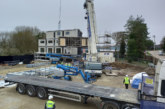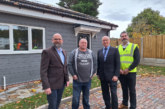
Björn Conway considers the options for building smart and how new techniques can help solve the UK’s shortage of affordable housing.
In his Budget speech, Phillip Hammond pledged to raise UK building targets to 300,000 new homes a year by 2025, the equivalent of a city the size of Leeds. The Chancellor cemented the Government’s position that the UK must build this volume of units a year in order to tackle the affordable housing problem.
Although this is a necessary and important move, the question of how we are going to increase construction to hit these levels still stands, given the constraints the industry is already experiencing. To meet the higher targets, manage the skills gap and provide additional capacity to that of established housebuilders, the industry is starting to look beyond traditional build methods to alternative solutions. A movement towards using ‘smart construction’ techniques is gaining momentum.
Smart construction
Smart construction offers a collaborative approach, making use of digital technologies and industrialised manufacturing techniques to minimise costs, speed up delivery times and make housebuilding more productive and sustainable. This includes digital design, new types of materials, data management, industrialised manufacturing also known as off-site, and other new building techniques.
The Construction Leadership Council (CLC), a partnership between government and industry, has recognised the importance of the uptake of smart construction. The CLC’s aim is to deliver more productivity, efficiency, skills and growth in UK housebuilding.
There are a number of players in the market that have already started carrying out smart construction successfully, and in the modular housing market in particular, real strides have been made in the past year.
ilke Homes, borne from a joint venture between Keepmoat Homes and Elliott, is a new independent British company looking to drive change and improve how affordable homes are delivered. ilke’s ambition is to: ‘build better homes and to build them in a better way’. It already has demonstration modular homes in London and is delivering its first homes to sites for open market sale in January 2018.
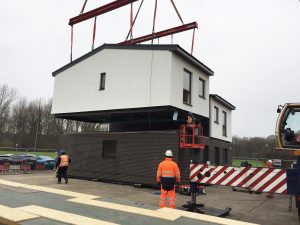 Modular homes
Modular homes
Offsite construction — used to create modular homes — holds a distinct advantage in that it can deliver properties in less than half the time of traditionally constructed homes. Sticking to a timeline is often an issue in construction, as there are so many factors that can influence the build: from poor weather conditions and access issues, to human error and the shortage of skilled workers. Smart construction, coupled with offsite manufacturing, can help eliminate these issues through building houses in a dry, clean environment with each step broken down into an easily replicable operation.
ilke’s homes are constructed in a factory, which means by the time they reach the site, they can be installed in a single day, with up to 10 homes installed per day. This means the journey from the installation of the homes to families moving in can take just two weeks, giving the rental providers, local authorities and developers that ilke homes partners with, a reliable and predictable timeline to work towards. For a medium-sized site, this could speed up build times considerably; leading to a build programme that is six months faster than a traditional site.
Concerns about the environment can also be answered with modular homes, which feature improved energy efficiency and high thermal performance thanks to the ‘Fabric First’ approach (low U-values) used in the build, improved airtightness and SEDBUK A-rated boilers. These elements reduce running costs and the construction approach and improved durability can reduce defect rectification and maintenance costs when considering the life performance of the homes.
ilke homes began last year by setting a target of delivering 750 homes per year. That figure has risen to 2,000, and it’s only by operating at such a scale that we’ll be able, as an industry, to make a material contribution to tackling the current housing crisis.
Gallions Reach case study
In May 2016, ilke Homes established a demonstration site on Greater London Authority land in Gallions Reach, East London. The site has already attracted widespread interest, with development and maintenance teams from over 60 organisations visiting the site to understand ilke Homes’ approach to partnering and to see the quality of the finished houses.
Gallions Reach provides examples of open market and affordable offsite modular properties. They demonstrate how a common module that is efficient to manufacture can be personalised to meet the Nationally Described Space Standards for social housing needs, and the requirements of open market sale, with a variety of internal and external treatments. The homes are attractive, energy-efficient, and demonstrate durability equal to that of traditionally built houses, offering partners and investors an idea of what they can expect from future projects carried out by ilke Homes.
“Offsite construction — used to create modular homes — holds a distinct advantage in that it can deliver properties in less than half the time of traditionally constructed homes.”
Before the homes were delivered, foundations, services, drainage and much of the landscaping was already complete. No scaffolding was required and the crane arrived in the morning, placed the units, and was dismantled on the same day. The homes were fully furnished, landscaped and operational for the launch event less than two weeks later.
Strong energy efficiency credentials are paramount at ilke Homes, and the homes at Gallions Reach are designed to be zero carbon in use. Fitted with photovoltaic (PV) cells, electrical power within the properties is generated using solar cells on the roof of the building, which results in lower energy bills for the residents of the properties.
Using innovative build methods means that affordable housing can be provided efficiently and effectively to the region even where there are shortages of traditional construction skills. With plans to open a factory in the northern powerhouse already underway, ilke Homes is well placed to contribute to tackling the housing crisis on a national scale.

